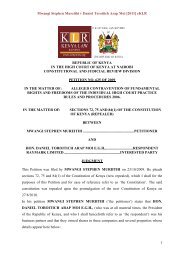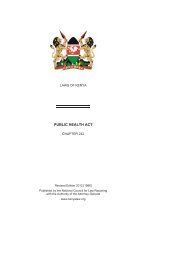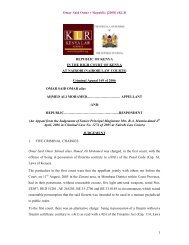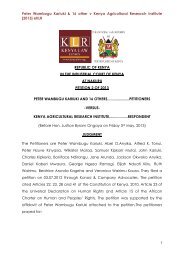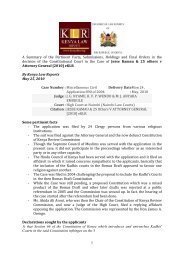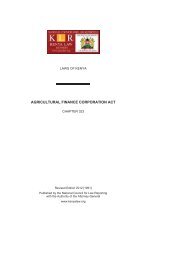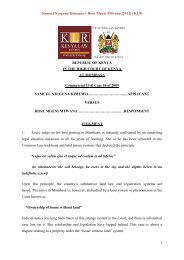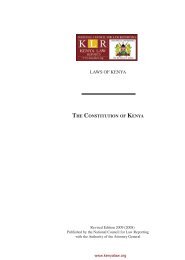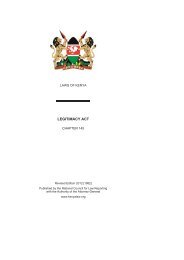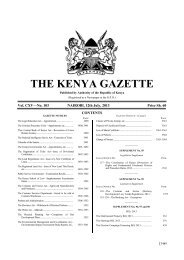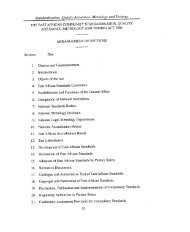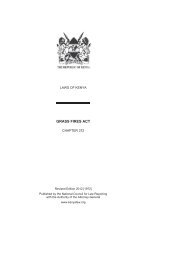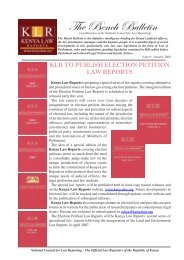Beatrice Wanjiku & another v Attorney General & another [2012 ...
Beatrice Wanjiku & another v Attorney General & another [2012 ...
Beatrice Wanjiku & another v Attorney General & another [2012 ...
Create successful ePaper yourself
Turn your PDF publications into a flip-book with our unique Google optimized e-Paper software.
<strong>Beatrice</strong> <strong>Wanjiku</strong> & <strong>another</strong> v <strong>Attorney</strong> <strong>General</strong> & <strong>another</strong> [<strong>2012</strong>] eKLRREPUBLIC OF KENYAIN THE HIGH COURT OF KENYAAT NAIROBI (NAIROBI LAW COURTS)Petition 190 of 2011BEATRICE WANJIKU......................................................................1 ST PETITIONERSTANLEY KARIUKI........................................................................2 ND PETITIONERANDHON. ATTORNEY GENERAL......................................................1 ST RESPONDENTCOMMISSIONER OF PRISONS....................................................2 ND RESPONDENTANDJOSEPH KAGURI MUNA..................................................1 ST INTERESTED PARTYROBINSON MUKIGI.........................................................2 ND INTERESTED PARTYIntroductionJUDGMENT1. The petitioners claim is straight forward. In their re-amended petition dated 14 th November<strong>2012</strong>, they state as follows;(5) Kenya has ratified the United Nations International Covenant Civil and Political Rightswhich at Article 11 disallows civil jail for matters whose cause of action arises fromcontractual obligations.(6) Article 2(5) and 2(6) of the Constitution incorporates into Kenyan Law the abovementioned convention and thus civil jail for debtors is unlawful.(7) Further, imprisonment of a debtor violates their rights as captured in the bill of rightsincluding the right to liberty and movement.1
<strong>Beatrice</strong> <strong>Wanjiku</strong> & <strong>another</strong> v <strong>Attorney</strong> <strong>General</strong> & <strong>another</strong> [<strong>2012</strong>] eKLR(8) The 2 nd respondent has continued to receive and detain debtors in various prisons in thecountry.2. The petitioners‟ case is that they bring this petition in the public interest and on behalf ofthose debtors found in their circumstances. The petitioners seek a declaration that civil jail fordebtors, violates, infringes or threatens rights and fundamental freedoms in the Constitutionand human rights conventions. The petitioners have decrees against them in Muranga PMCCNo. 285 of 2009, Joseph Kaguri Muna v <strong>Beatrice</strong> W. Gacathi and Kangema SRMCC No. 88of 2011 Robinson Mukingi v Stanley Kariuki. They have been subjected to the processprovided for committal to civil jail under the provisions of the Civil Procedure Act (Cap 21of the Laws of Kenya) and the Civil Procedure Rules.Petitioners’ Case3. The petitioners‟ claim is founded on the fact that Kenya has ratified the United NationsInternational Covenant on Civil and Political Rights (“ICCPR”) which at Article 11disallows civil jail for matters whose cause of action arises from contractual obligations. Bydint of Article 2(5) and (6), the ICCPR forms part of the laws of Kenya. The petitionerscontend that Article 2 creates a hierarchy of laws with the international conventions beingsuperior to national legislation therefore the provisions of the Civil Procedure Act contravenethe ICCPR.4. The petitioners complain that the imprisonment of debtors violates their fundamental rightsand freedoms protected in the Bill of Rights including the right to liberty and movement.According to them, the 2 nd respondent, the Commissioner of Prisons, has continued to receiveand detain debtors in various prisons across the country.5. As regards their specific cases, the petitioners‟ aver that the provisions of Order 22 rules34 and 35 of the Civil Procedure Rules which place on the judgment holder the burden ofproving that a judgment debtor has money and is merely refusing to pay was not adhered towhen they were committed to jail and their detention is therefore unfair, illegal and contraryto law and accordingly they urge this court to intervene by upholding their rights.Respondents’ Case2
<strong>Beatrice</strong> <strong>Wanjiku</strong> & <strong>another</strong> v <strong>Attorney</strong> <strong>General</strong> & <strong>another</strong> [<strong>2012</strong>] eKLR6. The <strong>Attorney</strong> <strong>General</strong> filed grounds of opposition dated the 10 th January <strong>2012</strong> and writtensubmissions dated 10 th July <strong>2012</strong> in which it is contended that there has been no breach of thepetitioners rights and fundamental freedoms as alleged or at all.7. The <strong>Attorney</strong> <strong>General</strong> argues that the fundamental rights and freedoms protected in theBill of Rights are not absolute save for those protected under Article 25 thereof and that theseare subject to the need to ensure that the enjoyment of these rights and freedoms by anyindividual does not prejudice the rights and fundamental freedoms of others. The <strong>Attorney</strong><strong>General</strong> submitted that the court is required to balance the rights of the petitioner guaranteedunder the Bill of Rights and the rights of the interested parties to recover their debts. Thisbalance, it is submitted, is required by Article 24.8. Ms Barasa, counsel for the <strong>Attorney</strong> <strong>General</strong>, submitted that the procedure provided underthe Civil Procedure Act and the Civil Procedure Rules (“the Rules”) particularly that relatingto the Notice to show cause against detention in prison is discretionary power granted to thejudicial officer in the execution of a money decree and that if the petitioners are aggrieved bythe decision of the court to send them to civil jail, they ought to have challenged the exerciseof discretion as well as the judgment in an appeal.9. The <strong>Attorney</strong> <strong>General</strong>‟s position is that Article 11 of the ICCPR which provides that, “Noone shall be imprisoned merely on the ground of inability to fulfill a contractual obligation,”implies that a judgment debtor can be committed to civil jail if there are compelling reasons,and that it is the petitioners‟ obligation to prove that reasons do not exist for such committal.Interested Party’s Case10. Only the 1 st interested party, Joseph Migwi Muna, appeared in these proceedings andopposed the petitition. He is one of the judgment creditors and his case is that section 40 ofthe Civil Procedure Act is part of our law and the statute has not been repealed. Furthermore,the ICCPR is neither superior to the Constitution nor to legislation.11. Counsel for the interested party, Mr Okindo, termed civil jail as a „very useful device‟which ought not be outlawed as creditors have fundamental rights to recover their money andto be protected from debtors who borrow with no intention of paying up.3
<strong>Beatrice</strong> <strong>Wanjiku</strong> & <strong>another</strong> v <strong>Attorney</strong> <strong>General</strong> & <strong>another</strong> [<strong>2012</strong>] eKLR12. The interested party‟s position is that at all material times, due process was followed, andthe 1 st petitioner was given the opportunity to propose payment by instalments which she didbut declined to honour the agreement to pay the instalments as they fell due.Issues for determination13. The pleadings disclose the following issues for determination;a) Whether there is a breach of the petitioners‟ rights under Article 11 of the ICCPR. Indetermining this question I have to consider the applicability of international law, treaties andconventions as part of Kenyan law as provided in Article 2(5) and 2(6) of the Constitution.b) Whether there has been a breach of the petitioners‟ fundamental rights and freedomsprotected under the Bill of Rights.Application of Article 11 of the ICCPR14. In support of its case, the petitioners relied on the decision of Justice Koome in ReZipporah Wambui Mathara Milimani BC Cause 19 of 2010 (Unreported). The applicantdebtor applied for release from civil jail on the basis that a receiving order had been made.After considering the provisions of the Bankruptcy Act, the learned judge stated as follows,“The provisions of the Constitution of Kenya 2010 was also invoked and this ruling would notbe complete without a commentary on those submissions. Principally I agree with counsel forthe debtor that by virtue of the provisions of Section 2(6) of the Constitution of Kenya 2010,International Treaties, and Conventions that Kenya has ratified, are imported as part of thesources of the Kenyan Law. Thus the provision of Article 11 of the International Covenant onCivil and Political Rights which Kenya ratified on 1 st May 1972 is part of the KenyanLaw. This covenant makes provisions for the promotion and protection of human rights andrecognises that individuals are entitled to basic freedoms to seek ways and means of betteringthemselves. It obviously goes without saying that a party who is deprived of their basicfreedom by way of enforcement of a civil debt through imprisonment, their ability to move andeven seek ways and means of repaying the debt is curtailed. For the above additional reasonsI will allow the application, the costs of this application will however be awarded to therespondent.”4
<strong>Beatrice</strong> <strong>Wanjiku</strong> & <strong>another</strong> v <strong>Attorney</strong> <strong>General</strong> & <strong>another</strong> [<strong>2012</strong>] eKLR15. Justice Koome seemed to suggest that the provisions of the Civil Procedure Act andRules were subject to ICCPR and that they could be invalidated on that basis that they wereinconsistent with its provisions.16. The same issue was once again raised in the case of Diamond Trust Kenya Ltd v DanielMwema Mulwa Milimani HCCC No. 70 of 2002 (Unreported) where the court was requiredto decide whether a warrant of arrest issued for the non-payment of a debt violated thefundamental rights and freedoms of the applicant. In his ruling, Justice Njagi addressed theissue of hierarchy of laws. He observed, “We have in this country a three tier hierarchy of thelaw. At the apex is the Constitution of Kenya, which is the supreme law of the land, to whichall other laws as subservient. Next in rank are Acts of Parliament, followed by subsidiarylegislation at the bottom of the pile. The Civil Procedure Act is an Act of parliament whichprovides for procedure in Civil Courts. Section 40 thereof makes provision for the arrest anddetention of judgment debtors……. To the extent that this Section provides for the arrest anddetention of a judgment-debtor, it is clearly in conflict with Article 11 of the InternationalConvention on Civil and Political Rights. The two are contradictory. This raises severalissues. Can the two provisions co-exist? If so, how can they operate side by side? And if anycannot co-exist, which of them should take precedence over the other? In my view, Article 11of the International Convention on Civil and Political Rights cannot rank pari passu with theConstitution. The highest rank it can possibly enjoy is that of an Act of Parliament. And evenif it ranks in parity with an Act of Parliament, it cannot oust the application of section 40 ofthe Civil Procedure Act. Nor for that matter, can it render section 40 unconstitutional. Forthat reason for as long as section 40 remains in the statute Book, it is not unconstitutional fora judgment-debtor to be committed to a civil jail upon his failure to pay his debts. Sincehowever, section 40 is at variance with the provisions of an International Convention which ispart of the law of Kenya, it follows that we now have two conflicting laws, none of which issuperior to the other. That conflict calls for re-consideration of the probative value of section40 in the light of the new Constitutional dispensation. Only after a revaluation can it bedetermined whether to retain section 40 in the Civil Procedure Act, or to do away with italtogether in favour of Article 40 should be repealed as being unconstitutional. In the spirit ofthe new Constitutional order, it is more likely than not that Kenyans would prefer a system inwhich there is no threat of civil jails. Until a decision is taken at a proper forum, section 40 ofthe Civil Procedure Act will continue to haunt the liberal freedoms enshrined in the5
<strong>Beatrice</strong> <strong>Wanjiku</strong> & <strong>another</strong> v <strong>Attorney</strong> <strong>General</strong> & <strong>another</strong> [<strong>2012</strong>] eKLRConstitution until it is repealed or found to be unconstitutional at a proper forum. In my view,where a section of the law takes away a right which is conferred by <strong>another</strong> section, theformer section should itself be taken away.”[Emphasis Mine]. Ultimately, the learned judgedeclined to express a position on the matter. It is this inquiry that now must be undertaken inthis case.17. Before the promulgation of the Constitution, Kenya took a dualist approach to theapplication of international law. A treaty or international convention which Kenya had ratifiedwould only apply nationally if Parliament domesticated the particular treaty or convention bypassing the relevant legislation. The Constitution and in particular Article 2(5) and 2(6) gavenew colour to the relationship between international law and international instruments andnational law. Article 2(5) provides, ―The general rules of international law shall form partof the law of Kenya‖ and Article 2(6) provides that ―Any treaty or convention ratified byKenya shall form part of the law of Kenya under this Constitution.‖18. While the Constitution is clear that international law is applicable in Kenya, it is therelationship between international instruments that Kenya has ratified and legislation thatlacks clarity hence the dilemma expressed by Justice Njagi in Diamond Trust Kenya Ltd vDaniel Mwema Mulwa (Supra).19. The petitioners argue that international instruments that Kenya has ratified are superior toActs of Parliament. Counsel submitted that the term ‗under this Constitution‘ employed inthe Article 2(6) means that the drafters of the Constitution must have intended for theinternational conventions to fall „immediately below‟ the Constitution in terms ofhierarchy. Furthermore, the petitioner‟s contended, the failure to include statutes and commonlaw in the hierarchy of laws under Article 2 suggests that the framers intended to confer thisstatus on treaties and conventions and the inclusion of international instruments implies thatthey have greater force of law than other sources of law which are not included in Article 2.20. I take the position that the use of the phrase “under this Constitution” as used in theArticle 2(6) means that the international conventions and treaties are „subordinate‟ to andought to be in compliance with the Constitution. Although it is generally expected that thegovernment through its executive ratifies international instruments in good faith on the behalfof and in the best interests of the citizens, I do not think the framers of the Constitution would6
<strong>Beatrice</strong> <strong>Wanjiku</strong> & <strong>another</strong> v <strong>Attorney</strong> <strong>General</strong> & <strong>another</strong> [<strong>2012</strong>] eKLRhave intended that international conventions and treaties should be superior to locallegislation and take precedence over laws enacted by their chosen representatives under theprovisions of Article 94. Article 1 places a premium on the sovereignity of the people to beexercised through democratically elected representatives and a contrary interpretation wouldput the executive in a position where it directly usurps legislative authority through treatiesthereby underminining the doctrine of separation of powers which is part of ourConstitutional set up.21. I think a purposive interpretation and application of international law must be adoptedwhen considering the effect of Article 2(5) and 2(6). These provisions should not be taken ascreating a hierarchy of laws akin to that set out in the provisions section 3 of the JudicatureAct (Chapter 8 of the Laws of Kenya). Article 2(5) and (6) must be seen in the light of thehistorical application of international law in Kenya where there was a reluctance by the courtsto rely on international instruments even those Kenya had ratified in order to enrich andenhance the enjoyment of human rights. I would also draw on the authority of Article 19(3)which is part of the Bill of Rights that recognizes other rights other than those protected bythe Bill of Rights provided they are not inconsistent with the Constitution. These rightswould be founded not only on specific statutes but also international treaties and conventions.22. Modern Constitutions contain freestanding provisions that regulate the relationshipbetween international law, customs and treaties, and national law. For example, theConstitution of South Africa has specific provisions separate from the supremacy clause,Articles 231, 231 and 233, which deal with theapplication of international law. In our case,the international law provisions are part of the supremacy clause. Article 2(5) and (6)regulates the relationship between international law and national law in two ways. First, byplacing the issue of international law within the supremacy clause, the supremacy of theConstitution is emphasized in relation to international law. Second, the application ofinternational law in Kenya is clarified to the extent that it not left in doubt that internationallaw is applicable in Kenya.23. The nature and extent of application of treaties must be determined on the basis of thesubject matter and whether there is domestic legislation dealing with the specific issue at handbearing in mind that legislative authority, which is derived from the people of Kenya, is7
<strong>Beatrice</strong> <strong>Wanjiku</strong> & <strong>another</strong> v <strong>Attorney</strong> <strong>General</strong> & <strong>another</strong> [<strong>2012</strong>] eKLRconferred by Parliament under Article 94 and when dealing with matters of fundamentalrights and freedoms, the duty to the court, when applying a provision of the Bill of Rights, toadopt the interpretation that most favours the enforcement of a right or fundamental freedomas provided in Article 20(3)(b). The issue then, is not necessarily one of hierarchy but ofapplication of treaties and conventions.24. The Civil Procedure Act and the Rules provide a legal regime for arrest and committalas a means of enforcement of a judgment debt. Article 11 of the Convention states that, “Noone shall be imprisoned merely on the ground of inability to fulfil a contractualobligation.”[Emphasis mine] I read the merely as used above to mean that one cannot beimprisoned for the sole reason of inability to fulfill a contractual obligation. It means thatadditional reasons other than inability to pay should exist for one to be imprisoned. Article 11recognises that in fact there may be instances where imprisonment for inability to fulfill acontractual obligation may be permitted. As there is no inconsistency between Article 11 ofthe Convention and the general tenor of the committal regime under Civil Procedure Act andthe Rules, the provisions of Article 11 of the Convention are at best an interpretative aid.Whether Civil Procedure Act is unconstitutional25. Sachs J., stated in Farieda Coetzee v Republic of South Africa Case No. CCT 19/94 atparagraph 44 that, “ there can be no doubt that committing someone to prison involves asevere curtailment of that person\'s freedom and personal security. Indeed, the very purposeof committal is to limit the freedom of the person concerned. Given the manifest andsubstantial invasion of personal freedom thus involved, the real issue that we have to decideis whether such infringement can be justified in terms of the general limitations on rightspermitted by Section 33 of the Constitution. This is the nub of the problem before us.”26. Whether committal to civil jail for a debt is unconstitutional has been the subject ofseveral decisions in Kenya. In the case of Zipporah Wambui Mathara (Supra), JusticeKoome expressed the view that, “There are several methods of enforcing a civil debt such asattachment of property. The respondent claims that the debtor has money in the bank, thatmoney can also be garnished. An order or imprisonment in civil jail is meant to punish,humiliate and subject the debtor to shame and indignity due to failure to pay a civil debt. That8
<strong>Beatrice</strong> <strong>Wanjiku</strong> & <strong>another</strong> v <strong>Attorney</strong> <strong>General</strong> & <strong>another</strong> [<strong>2012</strong>] eKLRgoes against the International Covenant on civil and political rights that guarantee partiesbasic freedoms of movement and of pursuing economic social and cultural development.”27. In Rosanna Pluda Moi v Philip Kipchirir Moi, Nairobi Divorce Cause No. 154 of 2008(Unreported) Justice G.B.M. Kariuki, J. expressed himself forcefully over the matter asfollows, “However, I hold the view that no one should be sent to Civil Jail for inability to paya debt. It would be morally wrong to do so. It would arguably also amount to discriminationagainst the have-nots. And it would make no sense to send to Civil Jail a person who isunable to pay. That would be malicious. In any case, it would amount to throwing away goodmoney after bad for the creditor. Civil Jail is for those who refuse to part with their money topay debts. The Respondent in this case is not unable to pay. He is not a man of straw. Thethesis by the Honourable Justice Nambuye in her Ruling delivered on 24 th May 2010 clearlyshows that the Respondent possesses resources from which he can, if he so wishes, pay themoney he owes by way of maintenance.” The judge further stated as follows, “Civil Jail is ameasure taken as a matter of final resort. In this case, the Petitioner has resorted to Civil Jailostensibly because she is unable to identify any property belonging to the Respondent whichshe can attach. She cannot be blamed. It is regrettable that the Respondent has failed toshoulder his obligation as a husband and a father and has allowed the matter to drift to thislevel.”28. It is now well established that where a petitioner seeks relief from the court for breach offundamental rights and freedoms under Article 22, he or she must set out with precision therights violated and the manner in which the rights have been violated in relation to him. (SeeAnarita K Njeru v R (No. 1) (1979) KLR 154 and Cyprian Kubai v Stanley KanyongaMwenda Nairobi HC Misc. No. 612 of 2002 (Unreported.) The petitioner‟s burden issomewhat lightened by the sentiments expressed by our courts which I have alluded to.29. But it would be important to remind ourselves why committal and imprisonmentconstitutes a violation of fundamental rights and freedoms guaranteed by our Constitution.The right to inherent dignity of the person protected under Article 28 is a proclamation of ourhumanity. Arbitrary arrest and imprisonment degrades the human spirit, affects families andrelationships. Arbitrary arrest and committal also infringes the right to security of the personprotected under Article 29, the right to a fair trial protected under Article 50(1) and the right9
<strong>Beatrice</strong> <strong>Wanjiku</strong> & <strong>another</strong> v <strong>Attorney</strong> <strong>General</strong> & <strong>another</strong> [<strong>2012</strong>] eKLRto movement under Article 39. A consideration of all these rights points to the a fact thatarrest and committal of a judgment-debtor constitutes a violation of the collectivity of theserights.30. The issue that calls for determination is whether such violation of rights through thecommittal and imprisonment of a judgment debtor is justifiable in an open and democraticsociety on the basis of the limitation to fundamental rights provided under Article 24 whichprovides as follows;24. (1) A right or fundamental freedom in the Bill of Rights shall not be limited except bylaw, and then only to the extent that the limitation is reasonable and justifiable in an openand democratic society based on human dignity, equality and freedom, taking into accountall relevant factors, including––(a) the nature of the right or fundamental freedom;(b) the importance of the purpose of the limitation;(c) the nature and extent of the limitation;(d) the need to ensure that the enjoyment of rights and fundamental freedoms by anyindividual does not prejudice the rights and fundamental freedoms of others; and(e) the relation between the limitation and its purpose and whether there are less restrictivemeans to achieve the purpose.31. The application of Article 24 involves the weighing of competing values and conductingan assessment based on proportionality but always bearing in mind that the purpose of theConstitution and particularly the Bill of Rights is to preserve the dignity of individual and topromote social justice and the realization of the potential of all human beings. Article 24 isnot a checklist and the weighing of these considerations is not to be approachedmechanically. La Forest J. of the Canadian Supreme Court in United States of America vCotroni 42 CRR 101 (1989) at 117 observed that, “In the performance of the balancing task… a mechanistic approach must be avoided. While the rights guaranteed by the Charter mustbe given priority in the equation, the underlying values must sensitively be weighed in a10
<strong>Beatrice</strong> <strong>Wanjiku</strong> & <strong>another</strong> v <strong>Attorney</strong> <strong>General</strong> & <strong>another</strong> [<strong>2012</strong>] eKLRparticular context against other values of a free and democratic society sought to bepromoted by the legislature.”32. The inquiry whether the process of arrest and committal to civil jail is reasonable andjustifiable in an open and democratic society is not novel. The Constitutional Court of SouthAfrica had the opportunity to pronounce on this issue in the case of Farieda Coetzee vRepublic of South Africa (Supra). The court was moved to rule on the constitutional validityof the provisions of the relevant legislation relating to the imprisonment of defaultingjudgment debtors. After considering the provisions the court concluded that the provisionswere overbroad and did not make a distinction between those who willfully refuse to settletheir debts even though they have the means and those who cannot pay because they do nothave the means but who fail to prove their inability to pay. As Krieglar J. put it, “[T]hestatute sweeps up those who cannot pay with those who can but simply will not.” The Courtheld that the provision on imprisonment for civil debt under the statute before them wasunconstitutional, not because such imprisonment was inherently unconstitutional under allcircumstances, but because the provision under consideration by them was unreasonable onaccount of being overly broad.33. The determination of the validity of the provisions concerning the imprisonment ofjudgment debtors calls for an examination of sections 38 and 40 of the Civil ProcedureAct. Section 38 grants the court powers to enforce execution. It provides;38. Subject to such conditions and limitations as may be prescribed, the court may on theapplication of the decree holder, order execution of the decree(a) – (c)(d) by arrest and detention in prison of any person.(e)-(f)PROVIDED that where the decree is for the payment of money, execution by detention inprison shall not be ordered unless, after giving the judgment–debtor an opportunity toshowing cause why he should not be committed to prison, the court for reasons to berecorded in writing is satisfied –11
<strong>Beatrice</strong> <strong>Wanjiku</strong> & <strong>another</strong> v <strong>Attorney</strong> <strong>General</strong> & <strong>another</strong> [<strong>2012</strong>] eKLR(a) That the judgment debtor with the object or effect of obstructing or delaying theexecution of the decree(i) Is likely to abscond or leave the locals limits of the jurisdiction of the court; or(ii) Has after the institution of the suit in which the decree was passed dishonestlytransferred, concealed or removed any part of his property, or committed any other act ofbad faith in relation to his property; or(b) That the judgment debtor has, or has had since the date of the decree, the means to paythe amount of the decree, or some substantial part thereof, and refuses or neglects or hasrefused or neglected, to pay the same, but in calculating such means there shall be left outof account any property which, by or under any law, or custom having the force of law, forthe time being in force, is exempted from attachment in execution of the decree; or(c) That the decree is for a sum for which the judgment debtor was bound in a fiduciarycapacity to account.34. Section 40 of the Civil Procedure Act provides as follows;40. (1) A judgment-debtor may be arrested in execution of a decree at any hour and on anyday, and shall as soon as practicable be brought before the court, and his detention may bein any prison of the district in which the court ordering the detention is situate, or, if suchprison does not afford suitable accommodation, in any other place which the Minister mayappoint for the detention of persons ordered by the courts of such district to be detained:Provided that –(i) for the purpose of making an arrest under this section, no dwelling-house shall beentered after sunset and before sunrise;(ii) no outer door of a dwelling-house shall be broken open unless such dwelling-house isin the occupancy of the judgment-debtor and he refuses or in any way prevents accessthereto; but when the officer authorized to make the arrest has duly gained access to any12
<strong>Beatrice</strong> <strong>Wanjiku</strong> & <strong>another</strong> v <strong>Attorney</strong> <strong>General</strong> & <strong>another</strong> [<strong>2012</strong>] eKLRdwelling-house he may break open the door of any room in which he has reason to believethe judgment-debtor is to be found;(iii) if the room is in the actual occupancy of a woman who is not the judgment-debtor, andwho according to the custom of her community does not appear in public, the officerauthorized to make the arrest shall give notice to her that she is at liberty to withdraw and,after allowing a reasonable time for her to withdraw and giving her reasonable facility forwithdrawing, may enter the room for the purpose of making the arrest;(iv) where the decree in execution of which a judgment-debtor is arrested is a decree forthe payment of money and the judgment-debtor pays the amount of the decree and the costsof the arrest to the officer arresting him, such officer shall at once release him.(2) The Minister may, by notice in the Gazette, declare that any person or class of personswhose arrest might be attended with danger or inconvenience to the public shall not beliable to arrest in execution of a decree otherwise than in accordance with such procedureas he may direct.35. The manner of depriving a person of liberty is prescribed by section 38 of the CivilProcedure Act as set out above. In cases where the decree is for payment of money, theperson or judgment debtor will not be committed to detention in prison unless he is first givenan opportunity of showing cause why he should not be committed to prison. The procedurefor giving the judgment-debtor an opportunity to show cause why he should not be committedto detention in prison is prescribed by Order 22 rules 7, 31, 32 and 35 of the Civil ProcedureRules which provide;Rule 7(1)7. (1) Where a decree is for the payment of money the court may on the oral application ofthe decree-holder at the time of the passing of the decree, order immediate executionthereof by the arrest of the judgment-debtor, prior to the preparation of a warrant, if he iswithin the precincts of the court.Rule 3113
<strong>Beatrice</strong> <strong>Wanjiku</strong> & <strong>another</strong> v <strong>Attorney</strong> <strong>General</strong> & <strong>another</strong> [<strong>2012</strong>] eKLR31. (1) Notwithstanding anything in these Rules, where an application is for the executionof a decree for the payment of money by the arrest and detention in prison of a judgmentdebtorwho is liable to be arrested in pursuance of the application, the court may, instead ofissuing a warrant for his arrest, issue a notice calling upon him to appear before the courton a day to be specified in the notice and show cause why he should not be committed toprison.(2) Where appearance is not made in obedience to the notice, the court shall, if the decreeholderso requires, issue a warrant for the arrest of the judgment-debtor.Rule 3232. Every warrant for the arrest of a judgment-debtor shall direct the officer entrusted withits execution to bring him before the court with all convenient speed, unless the amountwhich he has been ordered to pay, together with the interest thereon and the costs (if any)to which he is liable, be sooner paid.Rule 3434. (1) Where a judgment-debtor appears before the court in obedience issued under rule31, or is brought before the court after being arrested in execution of a decree for thepayment of money, and it appears to the court that the judgment-debtor is unable, frompoverty or other sufficient cause, to pay the amount of the decree, or, if that amount ispayable by instalments, the amount of any instalment thereof, the court may, upon suchterms as it thinks fit, make an order disallowing the application for his arrest and detentionor directing his release, as the case may be.(2) Before making an order for the committal of the judgment- debtor to prison, the court,for reasons to be recorded in writing, shall be satisfied —(a) that the judgment-debtor, with the object or effect of obstructing or delaying theexecution of the decree—(i) is likely to abscond or leave the local limits of the jurisdiction of the court; or14
<strong>Beatrice</strong> <strong>Wanjiku</strong> & <strong>another</strong> v <strong>Attorney</strong> <strong>General</strong> & <strong>another</strong> [<strong>2012</strong>] eKLR(ii) has, after the institution of the suit in which the decree was passed, dishonestlytransferred, concealed or removed any part of his property, or committed any other act ofbad faith in relation to his property; or(b) that the judgment-debtor has, or has had since the date of the decree, the means to paythe amount of the decree, or some substantial part thereof, and refuses or neglects, or hasrefused or neglected, to pay the same, but in calculating such means there shall be left outof account any property which is exempt from attachment in execution of the decree; or(c) that the decree is for a sum for which the judgment-debtor was bound in a fiduciarycapacity to account.(3) While any of the matters mentioned in subrule (2) are being considered, the court may,in its discretion, order the judgment-debtor to be detained in prison, or leave him in thecustody of an officer of the court, or release him on his furnishing security, to thesatisfaction of the court, for his appearance when required by the court.(4) A judgment-debtor released under this rule may be rearrested.(5) Where the court does not make an order under subrule (1), it shall cause the judgmentdebtorto be arrested, if he has not already been arrested, and, subject to the provisions ofthis Act, commit him to prison.36. Where the judgment-debtor does not make an appearance in obedience to the notice, thecourt shall, if the decree-holder so requires, issue a warrant for the arrest of the judgmentdebtorunder Rule 32(2). The warrant is issued to enforce court attendance of a judgmentdebtorwho has been served with the notice. Under Rule 35 aforesaid, where a judgmentdebtorappears before the court in obedience to a notice issued under Rule 32, or is broughtbefore the Court after being arrested in execution of a decree for the payment of money, hemay be examined on his means or otherwise to satisfy the amount of the decree and the courtmay on terms as it may think fit, make an order disallowing the application for his arrest anddetention, or directing his release, as the case may be. The application is disallowed if thejudgment-debtor is unable to pay the judgment debt as a result of poverty or other sufficientcause.15
<strong>Beatrice</strong> <strong>Wanjiku</strong> & <strong>another</strong> v <strong>Attorney</strong> <strong>General</strong> & <strong>another</strong> [<strong>2012</strong>] eKLR37. Where the Court however finds that the judgment debtor should be committed todetention in prison it must satisfy itself that the conditions for committal to prison in respectof a money decree are strictly fulfilled, and the court must take a record in writing of itsfindings before such committal. These conditions are set out in the proviso to section 38 ofthe Civil Procedure Act, and are repeated in Order 22 rule 34 (2).38. Section 40 of the Civil Procedure Act is not to be read in isolation. It is a consequence ofsection 38. It regulates the manner in which arrest and committal is effected in accordancewith section 38 and Order 22 of the Rules. Thus the reference to “a judgment-debtor may bearrested” does not refer to the power of the cout or judgment-creditor to effect arrest atanytime but rather that the power of arrest is consequent upon the court following theprocedure prescribed by section 38 and the rules promulgated for that purpose.39. In the case of Mohammed & Muigai Advocates v Samuel Kamau Macharia & AnotherMilimani HCCC 1158 of 2002 (Unreported), the constitutionality of the process of arrestand committal for a judgment debt was challenged. The judgment debtor argued that a Noticeto Show Cause was contrary to section 72 of the former Constitution prohibitingimprisonment or subjecting a person to inhuman and degrading treatment merely on the basisof inability to fulfil a contractual obligation and that Order 22 rules 7 and 32 permitteddeprivation of liberty before due process of law had been observed was contrary to section77(a) of the former Constitution.40. Justice Emukule held that Notice to Show Cause why Execution should not issue is acondition precedent to some form of inquiry prescribed by section 38 and Order 22 as towhat property or means of satisfying the decree the judgment debtor may have. The courtconcluded that the procedure prescribed if followed could not violate the provisions of a fairhearing.41. The provisions of the Civil Procedure Act and the Rules have been the subject of courtdecisions which have elucidated the manner in which committal and arrest for a judgmentdebtis to be effected. In National Bank Limited v Linus Kuria Ndung‘u Milimani HCCCNo. 81 of 1998(Unreported), Justice Lesiit considered the application of Order 22 rule35. The learned judge observed that, “The rule is very clear concerning the issues that thecourt should consider and be satisfied before making the order for committal to civil16
<strong>Beatrice</strong> <strong>Wanjiku</strong> & <strong>another</strong> v <strong>Attorney</strong> <strong>General</strong> & <strong>another</strong> [<strong>2012</strong>] eKLRjail. First to be adhered to is the requirement that the reason for which informed the DeputyRegistrar to decide the way he did must be recorded in writing …… the Deputy Registrarmust be satisfied;(i) That the judgment debtor has, since the date of the decree, the means to pay the amountof the decree and some substantial part thereof;(ii) And refuses or neglects or neglected to pay the same …..”42. The court also considered the issue of the burden of proof. Justice Lesiit held that, “Theburden of proof at the Notice to Show Cause lies with the decree holder at all times. It is theduty and evidential burden of the decree-holder to prove that the judgment debtor has or hashad the means to satisfy the decree and further that the judgment debtor has refused orneglected to pay.”43. As to whether the procedure for arrest and committal should be used as a last resort,Justice M. Ibrahim also commented on the procedure provided in the Rules in ElijahMomanyi p/a Anassi Momanyi and Company Advocates v Bartera Maiyo HC EldoretMisc. 149 of 2005 (Unreported), he stated, “In my view, execution by way of arrest andcommittal to civil jail must be done the last resort after all other options have beenexhausted. The deprival of an individual‟s liberty is not a matter to be treated lightly or inhaste. The protection of the right to liberty in my view is the most sacred of the fundamentalrights and freedoms of the individual. It should not be taken away easily and particularly inmatter relating to commercial transaction and civil litigation. The circumstances justifyingsuch action are equally established and certain facts and conditions must be shown to existbefore an order for committal to civil jail is made on the basis of failure to satisfy a propertydecree. Strictly, committal here is not intended to be punishment but a process through whicha debtor can be compelled to pay his debt after all the other usual methods have failed. Theexecution lacked all due process.”44. An analysis of the provisions of section 38 of the Civil Procedure Act and the Order 22of the Rules and their application demonstrates the following:17
<strong>Beatrice</strong> <strong>Wanjiku</strong> & <strong>another</strong> v <strong>Attorney</strong> <strong>General</strong> & <strong>another</strong> [<strong>2012</strong>] eKLRa) The process of arrest and detention is not arbitrary. The debtor is given an opportunity toshow cause before an order is made by a judicial officer.b) The Judgment-Creditor can only be committed to civil jail once it is demonstrated that heor she has refused or neglected to pay, is about to abscond or is intent on obstructing ordelaying execution of the decree.c) The burden of proof rests on the judgment-creditor to show prove the elements that arenecessary for the arrest and committal of the judgment-debtor.d) That arrest and committal is the last resort after other modes of execution have failed.e) There is a right of appeal against the decision of ordering arrest and committal.45. Order 22 rule 7 is a cause for concern as it empowers the court to issue a warrant ofarrest upon an oral application by the judgment creditor when passing the decree if thejudgment debtor is within the court prescincts. This provision in my view, does not entitle thejudgment debtor to sufficient notice nor opportunity to pay the debt even where he has themeans to do so. The rule as worded is an unnecessary infringement on the rights of thejudgment-debtor. This renders this particular rule unconstitutional.46. In my view, the conditions imposed by section 38 of the Civil Procedure Act and theRules means that the scope of arrest and committal is narrowly tailored for specific debtorswho meet the conditions set out in the statute. This position is unlike that obtaining when thecase of Farieda Coetzee v Republic of South Africa (Supra at paragraph 14) waspronounced. Justice Krieglar found that the Magistrates Court Act was indefensible forseveral reasons. The rules allowed persons to be imprisoned without having actual notice ofeither the original judgment or of the hearing. Even if a person has notice of the hearing, hecould be imprisoned without knowing of the possible defences available to him andaccordingly without any attempt to advance any of them. The rules also cast a burden on thedebtor with regard to inability to pay. The court also held that the provisions of Act whichspell out what the debtor must prove were unreasonably wide and also unreasonablypunitive. For example, the relevant provisions provided, inter alia, that the judgment debtorshall prove to the satisfaction of the court that he is not squandering his money or is18
<strong>Beatrice</strong> <strong>Wanjiku</strong> & <strong>another</strong> v <strong>Attorney</strong> <strong>General</strong> & <strong>another</strong> [<strong>2012</strong>] eKLRapparently living beyond his means or that he has not incurred debts other than for householdrequirements after the judgment date. The impugned procedure made no provision forrecourse by the debtor to the magistrate or higher authority once an order for committal hasbeen made. These provisions differ materially from those contained in the Civil ProcedureAct and Rules.47. The objective and intendment of the Civil Procedure Act and the Rules is to provide themechanism for the enforcement of judgment debts which is a legitimate and reasonable stateobjective and arrest and committal is one of enforcing court judgments. What is to be kept inmind whether the means adopted distinguished those who can pay but are merely refusing topay those who cannot; a distinction made by Justice G. B. M. Kariuki in Rosanna Moi vPhilip Moi (Supra).48. The Court must also consider the rights of judgment-creditors. Credit is an importantelement of the modern economic system and if the mode of enforcement of judgment-debts isunduly onerous, the granting of credit would be imperiled with attendant consequences tosociety as a whole. As the case of Rosanna Moi v Phillip Moi (Supra) illustrates even casesof maintenance of spouses and children, the use of arrest and committal may be useful againsta recalcitrant judgment-debtor.49. What the Constitution requires is that rights of the judgment debtor be considered andupheld in a manner that is consistent with the values of the Constitution. Save for theprovision of Order 22 rule 7(1) of the Civil Procedure Rules which I find and hold isunconstitutional, I find that the provisions of section 38 and 40 of the Civil Procedure Actand Order 22 rules 32 and 34 of the Rules are consistent with the Bill of Rights.Disposition50. The petitioners‟, who are judgment debtors, shall be subjected to the provisions of theCivil Procedure Act and the Rules and the magistrates dealing with their matters shall act inaccordance with established principles.51. I allow the petition only to the extent that I declare Order 22 rule 7(1) of the CivilProcedure Rules unconstitutional null and void.19
<strong>Beatrice</strong> <strong>Wanjiku</strong> & <strong>another</strong> v <strong>Attorney</strong> <strong>General</strong> & <strong>another</strong> [<strong>2012</strong>] eKLR52. I make no order as to costs.DATED and DELIVERED at NAIROBI this 23 rd day of July <strong>2012</strong>.D.S. MAJANJAJUDGEMr Onyoro instructed by Muchoki Kangata & Company Advocates for the petitioners.Ms I. N. Barasa, Litigation Counsel, instructed by the State Law Office for the respondents.Mr Okindo instructed by J.N. Mbuthia and Company Advocates for the 1 st interested party.20



